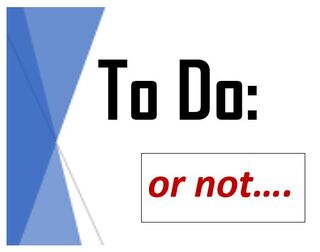Motivation
Count Me Out on Having a Bucket List
Sometimes the best moments are unscripted and unexpected.
Posted April 27, 2022 Reviewed by Gary Drevitch
Key points
- A "bucket list" can feel too prescribed and when items are not accomplished, it can feel like a failure.
- Goals are good, but be sure to make room for sponteneity and doing things you never thought of before.
- The journey is what is most important, so don't limit yourself by focusing on a list of pre-planned experiences that may never happen.

Goals and plans are great, but the concept of a “bucket list” that itemizes those experiences or achievements we hope to accomplish before we die makes me uncomfortable, and even a bit angry. It seems like a set-up for failure. Sure, in a movie people can run off and chase after completion of those items, but in reality, that list can become the things we feel we have failed at or regrets of things we never got around to doing.
I don’t like finite lists because:
- They can set us up for failure. Sure, making a list of things I hope to do can start out as fun and create excitement, but what happens over time as nothing or very few things get crossed off? Have I failed?
- Where is spontaneity, the thrill of just doing something without overthinking? Unless your bucket list includes “do something on a whim” then there are no spontaneous choices because once they are recorded on a concrete list, out goes the spontaneity.
- What about when life changes, especially those that come with age or changes in abilities? Does a medical condition that makes hiking the Grand Canyon impossible mean I have to see it as an item that I missed accomplishing in my life rather than accepting the ebb and flow of life changes?
- Thinking about what we have to do in our limited time can make us too self-focused, and see only the end point, not the journey of life itself.
When I started running in my twenties, I wanted to enter a road race. I trained, I did it, and did some more. I wanted to keep running and improve my times; I even had a numerical goal. But life happened and I never did accomplish that goal. But it was never on a life list, or etched in a life plan. I am so grateful I made the effort and moved myself from never trying at all to go on that journey. I am proud of the journey, and not at all disappointed that I didn’t reach that original goal. In retrospect, that goal, and many things that get committed to a “bucket list” are not realistic. If I had focused on my running the way I needed to achieve my goal of those years, I would have had to steal time and energy away from the other things I did, like going to school and starting my career and forging important relationships. I am not saying that those are more important for everyone, but they were for me. And sometimes the career thing and relationships took a bad turn, and I needed to be flexible and spontaneous and willing to refocus on my goals and put energy towards new goals.
My feeling is for all of us to go ahead and make plans, set goals, but do so with an attitude that all are written in pencil and can be changed. I come from a family of Eastern European Jewish immigrants, whose lives were always uncertain and for whom future planning was mostly a dream because so much was out of their control and at the mercy of larger social and economic conditions. From my family I learned an important Yiddish saying that comes to mind whenever life throws me a twist or upends a plan. I paraphrase: “We plan and God laughs.” For my family that was our way of shrugging off the obstacles and barriers to what might have been on a bucket list but were thwarted.
This perspective helped to take away the sting of not following through on a plan and instead prepared me to accept the unforeseen and do the best I could. It didn’t stop me from making goals, but I learned to view those goals as ideas, not concrete items on a list. It helped me to concentrate on those things to do for here and now and accept that not all might be reached. There would be new and different goals, ones that I have yet to even imagine. I learned that the journey is the only list I need.


